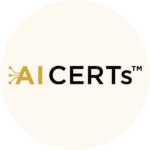
AI CERTS
3 weeks ago
India’s AI Healthcare Revolution: How Doctors, Hospitals, MedTech, and Pharma Are Leading the Future of Digital Health
New Delhi, India — In an era where artificial intelligence (AI) is transforming every industry, India’s healthcare sector is undergoing a seismic shift. From hospital corridors to diagnostic labs, from medical startups to pharmaceutical research hubs — AI is emerging as a powerful catalyst for innovation, efficiency, and accessibility in the country’s vast and complex healthcare system.
The Rise of AI in Indian Healthcare
India, with its 1.4 billion population and an ever-increasing demand for quality and affordable healthcare, faces a critical challenge: delivering timely and accurate medical services across urban and rural regions. To bridge this gap, the healthcare ecosystem is embracing artificial intelligence in ways that are not just revolutionary but life-saving.
A report by NITI Aayog estimates that AI in healthcare could add up to $957 billion to India’s economy by 2035. The convergence of AI with data analytics, cloud computing, and wearable technologies is creating a new ecosystem where diagnostics, treatments, and patient care are becoming faster, smarter, and more personalized.

Doctors and AI: Collaborative Intelligence
Contrary to popular fear, AI is not replacing doctors — it is augmenting their decision-making power. Radiologists now use AI-powered tools to detect anomalies in X-rays and MRIs with higher accuracy. Startups like Qure.ai are leading the way, providing radiology AI solutions that help identify tuberculosis, brain bleeds, and lung diseases, especially in resource-poor settings.
AI is also transforming primary care through Natural Language Processing (NLP) and machine learning. Smart assistants can transcribe patient visits, generate clinical notes, and even recommend potential diagnoses based on historical health data. For general physicians, this reduces the burden of paperwork and enhances patient interaction.
Hospitals: Automation and AI Infrastructure
Leading hospitals in India, such as Apollo, Fortis, and AIIMS, are adopting AI for hospital management, predictive analytics, and robotic-assisted surgeries. AI-enabled systems now optimize bed allocation, forecast patient inflow, monitor ICU vitals in real time, and help schedule procedures based on urgency and resource availability.
Apollo Hospitals launched its Clinical Intelligence Engine, which uses AI algorithms to assist doctors with accurate diagnosis suggestions based on symptoms and test results — improving care quality and reducing misdiagnosis rates.
MedTech: Diagnostics and Remote Care
Indian MedTech startups are rapidly innovating in diagnostics and telemedicine. Companies like Niramai use thermal imaging and machine learning to detect breast cancer in its early stages, without radiation or physical contact. This non-invasive method is particularly valuable in rural screening programs.
AI-enabled wearable devices like GOQii and HealthifyMe track vitals such as heart rate, sleep, and blood sugar, offering personalized health recommendations. These devices also share real-time data with physicians, allowing for continuous remote patient monitoring.
Pharmaceuticals: Drug Discovery and Precision Medicine
AI is shortening the lengthy and expensive process of drug discovery. Companies like Tata Consultancy Services (TCS) and Biocon are integrating AI platforms to identify molecular targets, simulate drug interactions, and optimize clinical trial designs. This has led to a significant acceleration in drug development timelines.
Furthermore, AI-driven genomic analysis is enabling personalized medicine in India — where treatments are tailored to a patient’s genetic makeup, leading to better outcomes and fewer side effects.
Public Health and Rural Outreach
AI is also transforming India’s public health initiatives. Projects like Aarogya Setu and eSanjeevani (India’s national telemedicine service) use AI-powered interfaces to track disease spread, deliver tele-consultations, and provide healthcare access to rural populations. These platforms saw massive engagement during the COVID-19 pandemic and continue to be scaled for chronic disease management, maternal health, and mental health.
Challenges and Ethical Concerns
Despite its promise, India’s AI healthcare journey faces challenges — data privacy, regulatory oversight, infrastructure gaps, and the digital divide. Ethical concerns around algorithmic bias, accountability, and AI explainability are being debated at policy levels.
Experts argue that AI must be implemented with transparency and robust ethical frameworks. A human-in-the-loop approach — where AI assists but does not override medical professionals — remains vital for patient safety and trust.
The Road Ahead
The Indian government’s National Digital Health Mission and initiatives by the Ministry of Electronics and Information Technology (MeitY) are paving the way for a digitally connected, AI-powered health ecosystem. With strategic public-private partnerships, skill development in AI and data science, and investments in innovation hubs, India is poised to become a global leader in digital health.
As AI becomes the stethoscope of the 21st century, India’s healthcare transformation stands as a beacon of how technology, when harnessed responsibly, can enhance lives, save millions, and ensure equitable healthcare for all.
Source-